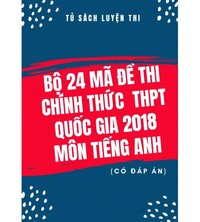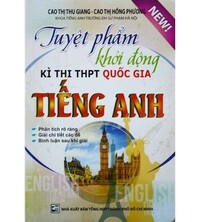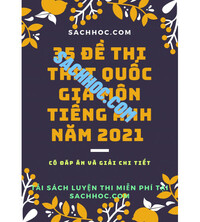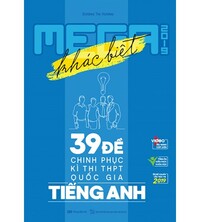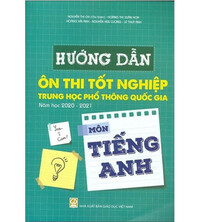Đề thi thử THPT Quốc gia môn Tiếng Anh năm 2016 có đáp án
Đề thi thử THPT Quốc gia môn Tiếng Anh năm 2016 trường THPT Hà Đông, Hải Dương (Lần 2) là tài liệu ôn thi THPT Quốc gia, ôn thi Đại học mới nhất năm 2016 với nhiều dạng bài tập hay và hữu ích giúp các em học sinh định hướng và ôn tập hiệu quả. Sau đây mời các em cùng làm bài nhé!
Đề thi thử THPT Quốc gia năm 2016 môn Tiếng Anh trường THPT Thuận Thành 1, Bắc Ninh (Lần 2)
Đề thi thử THPT Quốc gia năm 2016 môn Tiếng Anh trường THPT Đa Phúc, Hà Nội (Lần 2)
Đề thi thử THPT Quốc gia năm 2016 môn Tiếng Anh trường THPT Đoàn Thượng, Hải Dương (Lần 2)
| SỞ GD & ĐT HẢI DƯƠNG TRƯỜNG THPT HÀ ĐÔNG --------------- | ĐỀ THI THỬ LẦN II KÌ THI THPT QUỐC GIA NĂM 2016 MÔN: TIẾNG ANH Thời gian làm bài: 90 phút |
A. SECTION A (8 points)
Mark the letter A, B, C, or D on your answer sheet to indicate the word whose underlined part differs from the other three in pronunciation in each of the following questions.
Question 1. A. Valentine B. imagine C. discipline D. determine
Question 2. A. heavy B. head C. weather D. easy
Mark the letter A, B, C, or D on your answer sheet to indicate the word that differs from the rest in the position of the main stress in each of the following questions.
Question 3: A. explanation B. preparation C. considerate D. information
Question 4: A. capture B. picture C. ensure D. pleasure
Question 5: A. different B. important C. essential D. negation
Mark the letter A, B, C, or D on your answer sheet to indicate the correct one to complete each of the following sentences.
Question 6: It was in this house ______.
A. I was born in B. in which I was born C. where I was born D. that I was born
Question 7: Thailand defeated Laos______3______2.
A. with/by B. with/ of C. by/of D. by/to
Question 8: A: "I am sorry. I broke the vase." B: "______."
A. OK. Go ahead B. Yes, certainly
C. Don't worry. Things break. D. I'd rather not.
Question 9: When ______ to explain his mistake, the new employee cleared his throat nervously.
A. asking B. to be asked C. to be asking D. asked
Question 10: Stay out of this problem and do not interfere, please! It's none of your _______!
A. work B. job C. business D. action
Question 11: John ____ this task yesterday morning, but I did it for him. He owes me a thank-you.
A. must have completed B. should have completed
C. could have completed D. may have completed
Question 12: ____ furniture needs supplying for the schools in the whole country will slow down the process of the reform of education.
A. Few B. A few C. Little D. That little
Question 13: "What do you want me to cook for your dinner? "____. "
A. Yes, give up B. Yeah, your meal is great C. It's up to you D. Let me go
Question 14. Peter was ejected after committing five personal _________ in water sport game yesterday.
A. mistakes B. faults C. fouls D. errors
Question 15. The activities of the international marketing researcher are frequently much broader than _____.
A. the domestic marketer has B. the domestic marketer does
C. those of the domestic marketer D. that which has the domestic marketer
Question 16. Having been selected to represent the Association of American Engineers at the International Convention, __________.
A. the members applauded him B. a speech had to be given by him
C. the members congratulated him D. he gave a short acceptance speech
Question 17. Although David was ____ after a day's work in the office, he tried to help his wife the household chores.
A. exhaustion B. exhausted C. exhausting D. exhaustive
Question 18: Although they are poor and hard, they are ____ to their children's success.
A. content B. proud C. satisfied D. boastful
Question 19: Uncle Ho's desire was that our country might______other countries in the world.
A. be fed up with B. make use of C. keep pace with D. take grand for
Question 20: Don't bother me while I___________.
A. am working B. was working C. will work D. will have
Question 21: __________the laser beam is very thin, it is intense enough to drill through the most delicate bones.
A. When B. While C. Since D. Although
Question 22: No one died in the accident,________?
A. didn't they B. did he C. didn't he D. did they
Question 23: -"Do you mind if I take a seat?" - "_____________ ."
A. Yes, I don't mind B. No, do as you please
C. No I mind D. Yes, do as you please
Question 24: Jack made me _______ him next week.
A. promise calling B. to promise calling
C. to promise to call D. promise to call
Mark the letter A, B, C or D on your answer sheet t o indicate the word(s) SIMILAR in meaning to the underlined word(s) in each of the following questions.
Question 25: He was asked to account for his presence at the scene of the crime"
A. complain B. explain C. exchange D. arrange
Question 26: The repeated commercials on TV distract many viewers from watching their favourite films.
A. businesses B. advertisements C. contests D. economics
Question 27: Ms Stanford is an unusually prolific author. She has written a large number of books these years, some of which are best-sellers.
A. reflective B. productive C. exhausted D. critical
Mark the letter A,B,C or D on your sheet to indicate the word(s) OPPOSITE in meaning to the underlined words in each of the following sentences.
Question 28: We ought to keep these proposals secret from the chairman for the time being.
A. revealed B. frequented C. accessible D. lively
Question 29: They protested about the inhumane treatment of the prisoners.
A. vicious B. warmhearted C. callous D. coldblooded
Mark the letter A, B, C, or D on your answer sheet to indicate the underlined part that needs correction in each of the following questions.
Question 30: The children were playing last night outdoors when it began to rain very hard.
A B C D
Question 31: She asked why did Mathew look so embarrassed when he saw Carole.
A B C D
Question 32: I'd prefer to do it on myself, because other people make me nervous.
A B C D
Question 33: All the candidates for the scholarship will be equally treated regarding of their age, sex, or nationality.
A B C D
Question 34. Because of the cold weather, we kept the fire burning all long day.
A B C D
Read the following passage and mark the letter A, B, C, or D on your answer sheet to indicate the correct word for each of the blanks.
(35)____ history, women have always aimed for the recognized place in (36)____. Guided by their own (37)____ of knowledge and expertise, women like Marie Curie in science, Mary Wollstonecraft in literary writing, Simone de Beauvois in philosophical existentialist debate, and Marie Stopes in medicine, to name a few, have brought about (38)____ awareness of the role of the women in any walks of life. These women have helped redefine and (39)____ the nature of women's place in society. Today the (40)____ of global women's organizations and the impact of women's contributions (41)____ society show that progress has been made and the progress in furthering the role of women in society has been some benefit to the (42)____ woman. It is true to say that not all women have the same need. The need of the woman who stays at home and (43)_____ children will differ widely from the woman who works outside. Nonetheless, in the extensive field of equal opportunities, it would be good to know that access in given to both with equal measure according to the true value of respective abilities. It also would be good to know that the woman at home is recognized as a valued (44)____ of society just as much as the one who deals on business outside the home.
Question 35. A. Throughout B. Among C.During D. Upon
Question 36. A. social B. society C. socialize D. socialist
Question 37. A. region B. farm C. path D. field
Question 38. A. a B. an C. the D. no article
Question 39. A. gain B. encourage C. consolidate D. force
Question 40. A. right B. spread C. limit D. belief
Question 41. A. on B. for C. with D. at
Question 42. A. own B. private C. individual D. personal
Question 43. A. rises B. raises C. increases D. lifts
Question 44. A. party B. competitor C. partner D. member
Read the following passage and mark the letter A, B, C, or D on your answer sheet to indicate the correct answer to each of the questions.
As the twentieth century began, the importance of formal education in the United States increased. The frontier had mostly disappeared and by 1910 most Americans lived in towns and cities. Industrialization and the bureaucratization of economic life combined with a new emphasis upon credentials and expertise to make schooling increasingly important for economic and social mobility. Increasingly, too, schools were viewed as the most important means of integrating immigrants into American society.
The arrival of a great wave of southern and eastern European immigrants at the turn of the century coincided with and contributed to an enormous expansion of formal schooling. By 1920 schooling to age fourteen or beyond was compulsory in most states, and the school year was greatly lengthened. Kindergartens, vacation schools, extracurricular activities, and vocational education and counseling extended the influence of public schools over the lives of students, many of whom in the larger industrial cities were the children of immigrants. Classes for adult immigrants were sponsored by public schools, corporations, unions, churches, settlement houses, and other agencies.
Reformers early in the twentieth century suggested that education programs should suit the needs of specific populations. Immigrant women were once such population. Schools tried to educate young women so they could occupy productive places in the urban industrial economy, and one place many educators considered appropriate for women was the home.
Although looking after the house and family was familiar to immigrant women, American education gave homemaking a new definition. In pre-industrial economies, homemaking had meant the production as well as the consumption of goods, and it commonly included income-producing activities both inside and outside the home, in the highly industrialized early-twentieth-century United States, however, overproduction rather than scarcity was becoming a problem. Thus, the ideal American homemaker was viewed as a consumer rather than a producer. Schools trained women to be consumer homemakers cooking, shopping, decorating, and caring for children "efficiently" in their own homes, or if economic necessity demanded, as employees in the homes of others. Subsequent reforms have made these notions seem quite out-of-date.
Question 45: The paragraph preceding the passage probably discusses _____.
A. the most important means of integrating immigrants into American society in the nineteen century.
B. the urbanization in the United States in the nineteen century.
C. the industrialization and the bureaucratization of economic life the United States in the 19th century
D. the formal schooling in the United States in the nineteen century.
Question 46: It can be inferred from paragraph 1 that one important factor in the increasing importance of education in the United States was _____.
A. the increased urbanization of the entire country
B. the expanding economic problems of schools
C. the growing number of schools in frontier communities
D. an increase in the number of trained teachers
Question 47: The word "means" in line 5 is closest in meaning to _____.
A. probability B. qualifications
C. advantages D. method
Question 48: The phrase "coincided with" in line 7 is closest in meaning to _____.
A. ensured the success of B. began to grow rapidly
C. happened at the same time as D. was influenced by
Question 49: According to the passage, one important change in United States education by the 1920's was that _____.
A. most places required children to attend school
B. adults and children studied in the same classes
C. new regulations were imposed on nontraditional education
D. the amount of time spent on formal education was limited
Question 50: "Vacation schools and extracurricular activities" are mentioned in line 9 to illustrate _____.
A. the importance of educational changes
B. alternatives to formal education provided by public schools
C. the increased impact of public schools on students
D. activities that competed to attract new immigrants to their programs.
Question 51: According to the passage, early-twentieth century education reformers believed that _____.
A. different groups needed different kinds of education
B. corporations and other organizations damaged educational progress
C. more women should be involved in education and industry
D. special programs should be set up in frontier communities to modernize them
Question 52: The word "it" in paragraph 4 refers to _____.
A. homemaking B. consumption
C. education D. production
Question 53: Women were trained to be consumer homemakers as a result of _____.
A. overproduction in the highly industrialized early-twentieth-century United States
B. economic necessity in the highly industrialized early-twentieth-century United States
C. scarcity in the highly industrialized early-twentieth-century United States
D. income-producing activities in the highly industrialized early-twentieth-century United States
Question 54: The word "others" in paragraph 4 means_______.
A. other women B. other homes
C. other children D. other employees
Read the following passage and mark the letter A, B, C, or D on your answer sheet to indicate the correct answer to each of the questions.
Our eyes and ears might be called transformers because they sense the light and sound around us and turn them into electrical impulses that the brain can interpret. These electrical impulses that have been transformed by the eyes and ears reach the brain and are turned into messages that we can interpret. For the eye, the process begins as the eye admits light waves, bends them at the cornea and lens, and then focuses them on the retina. At the back of each eye, nerve fibers bundle together to form optic nerves, which join and then split into two optic tracts. Some of the fibers cross so that part of the input from the right visual field goes into the left side of the brain, and vice versa. The process in the ear is carried out through sensory cells that are carried in fluid- filled canals and that are extremely sensitive to vibration. Sound that is transformed into electricity travels along nerve fibers in the auditory never. These fibers form a synapse with neurons that carry the messages to the auditory cortex on each side of the brain.
Question 55. According to the author, we might call our eyes and ears "transformers" because:
A. They sense light and sound C. The create electrical impulses.
B. The brain can interpret the input D. The messages travel in the brain.
Question 56. Which of the following is closet in meaning to the word "admits"?
A. Focuses on B. Interprets
C. Lets in D. Selects
Question 57. What does the word ' them" in line 2 refer to ?
A. Eyes and ears B. Light and sound
C. Transformers D. Electrical impulses
Question 58. The word "bundle" could best be replaced by which of the following?
A. Group B. Grow C. Branch D. Settle
Question 59. The word "split" is closest in meaning to which of the following?
A. Tear B. Crack C. Fracture D. Separate
Question 60. What does the word "them" in line 6 refer to ?
A. Light waves B. vessels C. Eyes D. Messages
Question 61. According to the passage, when input from the right visual field goes into the left side of the brain , what happen?
A. The nerve fibers bundle together B. The optic nerves split
C. The retina receives light waves D. Input from the left field goes to the right side.
Question 62. The phrase " carried out" could be best be replaced by which of the following?
A. Brought over B. Taken away C. Accomplished D. Maintained
Question 63. Which of the following is most similar to the word "vibration"?
A. Sound B. Movement C. Light D. Heat
Question 64. According to the passage, optic nerves eventually.............
A. Bend B. Split C. Admit light waves D. Become messages
B. SECTION B (2 points)
I. Finish each of the following sentences in such a way that it means the same as the sentence printed before it. Write your answers on your answer sheet. (0.5point)
Question 65: The chair isn't safe. Don't stand on it.
→ The chair isn't _______________________________________________ .
Question 66: I haven't been to the cinema for two months.
→ The last _______________________________________________ .
Question 67.It is thought that the accident was caused by human error.
→ The accident ________________________________________________.
Question 68. "Would you like to come to my party tomorrow?" Jean invited me.
→ Jean ________________________________________________.
Question 69: He did not realize how difficult the task was until he was halfway through it.
→ Not until __________________________________________________.
II. In about 140 words, write a paragraph about the advantages of city life.
Write your paragraph on your answer sheet. (1.5poínt)
The following prompts might be helpful to you.
- More job opportunities
- So many comfortable entertainment services
- Convenience of Public Transportation
..........................................................................................................................................................................................
..........................................................................................................................................................................................
